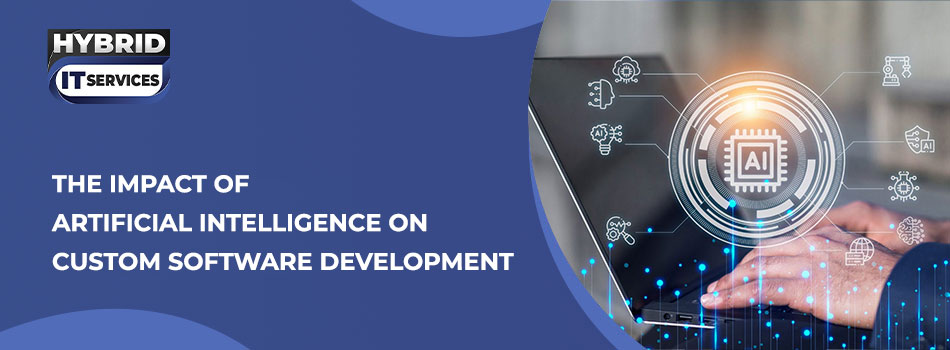Few advancements in the technology world have been as transformative as artificial intelligence.
Its integration into various sectors has revolutionized operations from healthcare to finance, and one area where its impact is particularly profound is software development.
As AI continues to evolve, it is reshaping the landscape of how software is conceptualized, created, and maintained.
Hybrid IT services play a key role in helping businesses integrate AI into their software development processes, enhancing efficiency and innovation.
How does AI make a Difference in Software Development?
Let's now explore the impactful integration of AI in software engineering and try to understand its significance in today's tech-driven world.
Adaptability and learning
The AI system is limited to the knowledge and training data it has received. Software development is dynamic, and developers must continually learn and adapt to new technologies, tools, and methodologies. Humans excel at learning and staying up-to-date.
Streamlining Development process
Normally, software development involves a significant amount of manual effort, from writing code to debugging and testing. However, AI has introduced automation into this process, significantly reducing the time and resources required.
Machine learning algorithms can analyze vast amounts of data to identify patterns and generate code snippets, accelerating the development timeline.
Learn how custom software development can save time and reduce costs by reading Mistakes to Avoid in Custom Software Development.
Boost Efficiency and Productivity
AI-powered tools like predictive analytics and code generation platforms enable developers to work more efficiently.
The tools can anticipate potential issues, suggest optimized solutions, and automate repetitive tasks, allowing developers to focus on more creative aspects of the work. Consequently, teams can deliver projects faster without compromising on quality.
Improved Software Quality
Quality assurance is critical in software development, but manual testing methods are time-consuming and prone to human error.
AI-driven testing tools can perform comprehensive tests across different platforms and devices, detecting bugs and vulnerabilities more accurately.
This results in higher-quality software with fewer defects, leading to better user experiences and increased customer satisfaction.
Personalized User Experiences
AI algorithms can analyze user behavior and preferences to personalize software experiences. Whether recommending relevant features or customizing interfaces, AI enables developers to create tailored solutions that cater to individual user needs. This not only enhances user satisfaction but also fosters customer loyalty and engagement.
Understanding user needs
Understanding and empathizing with user needs, preferences, and experiences is a human skill that is difficult for AI to replicate. Developers play a crucial role in creating user-centric software.
Communication and Collaboration
Effective communication and collaboration are essential in software development, especially when working in teams or with clients. Humans excel in interpersonal skills and teamwork, which are challenging for AI to replicate.
Empowering Innovation
AI opens up new avenues for innovation in software development. Natural language processing algorithms enable the creation of conversational interfaces and chatbots, transforming how users interact with applications.
Additionally, AI-powered technologies like computer vision and voice recognition are driving advancements in fields such as augmented reality and virtual reality, unlocking possibilities for software developers.
Debugging and User Experience
Another capability of artificial intelligence is to debug complex software issues and resolve problems that human resources cannot resolve.
While AI can analyze data and provide insights, the design of user interfaces and user experiences requires human creativity and an understanding of aesthetics and usability.
Addressing Complexity and Scale
Modern software systems are becoming increasingly complex, requiring developers to manage vast amounts of data and interconnected components.
AI offers solutions to these challenges by providing insights into system performance, optimizing resource allocation, and automating scalability. This ensures that software remains responsive and reliable even as demand grows.
Common Challenges of Implementing AI for Software Development
While AI offers transformative advantages, implementing it in software development comes with its own set of challenges.
From data requirements to financial investment and technical expertise, businesses must navigate these hurdles strategically to maximize the potential of AI-driven solutions.
Let's explore some of organizations' most common challenges when integrating AI into their development processes.
- Data dependency
- High implementation cost
- Skill Gaps
- Complexity of AI models
- Resistance to Change
- Ongoing maintenance requirement
- Ethical and regulatory concerns
The Future of AI in Software Development
The future of AI in software development promises groundbreaking advancements, transforming how developers create, deploy, and manage applications.
Emerging trends such as generative AI, autonomous coding, and AI-powered project management tools are set to streamline processes, enabling faster development cycles and reducing human error.
As machine learning models become more sophisticated, personalized software solutions tailored to specific user needs will become more accessible.
For a deeper dive into the impact of digital transformation, read The Role of Custom ERP Software in Digital Transformation.
Furthermore, integrating AI with technologies like quantum computing and the Internet of Things (IoT) will likely unlock unprecedented capabilities, reshaping the industry and driving innovation across all sectors.
By partnering with the industry experts at Hybrid IT Custom Software Development, you can embrace the future of AI in software development and seamlessly integrate it into your software systems.
Conclusion
Integrating Artificial Intelligence into software development is not just a trend but a fundamental shift in how software is conceptualized, created, and deployed.
By streamlining processes, enhancing efficiency, and fostering innovation, AI empowers developers to build better software faster.
As AI technologies advance, we can expect further transformative impacts on the software development landscape, paving the way for a future where intelligent systems play an even more significant role in shaping our digital experiences.






